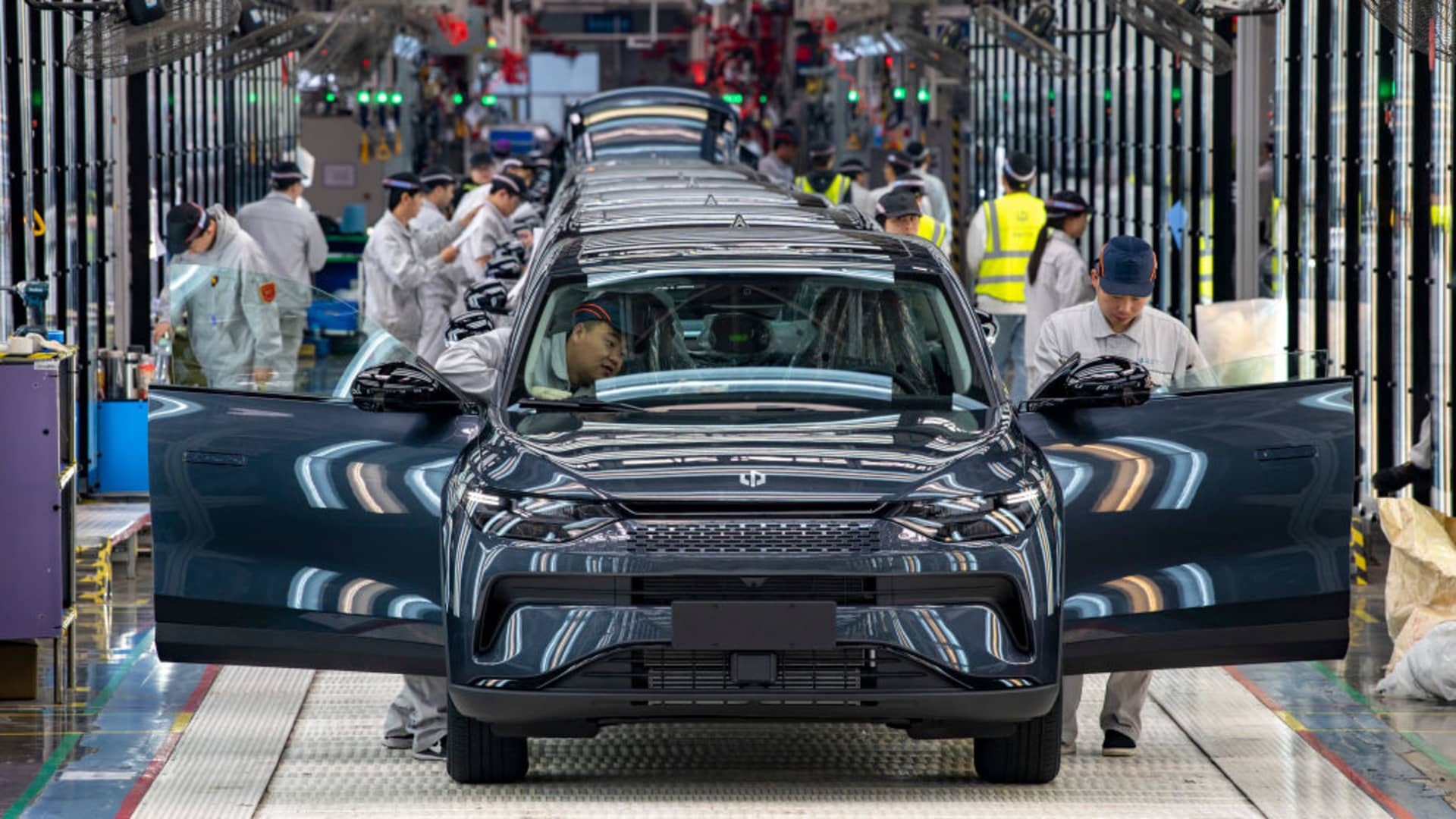China has accused the European Union of “blatant protectionism” after its executive arm unexpectedly launched an “anti-subsidy” investigation into China’s electric vehicle makers.
The Chinese Commerce Ministry urged dialogue to safeguard the interests of Chinese companies and commit to global efforts to address climate change and achieve carbon neutrality.
“China believes the investigations announced by the European Union in the name of ‘fair competition’ are actually aimed at protecting its own industries,” the ministry said at a regular press conferences Thursday, according to a CNBC translation.
“It’s a blatantly protectionist act that will seriously disrupt and distort the global — inclusive of the EU —automotive industry and supply chain and will have a negative impact on China-EU economic and trade relations,” the ministry said.
If the EU finds harm from Chinese subsidies, Brussels is likely to impose tariffs on Chinese EVs despite the risk of political and economic backlash from Beijing.Eurasia Group
The EU’s announcement Wednesday marked another escalation in EU-China relations and echoes the impact of robust competition from Chinese companies in Europe’s solar industry.
In late May, the U.S. and Europe agreed to reduce their dependency on Beijing — but rather than completely cut ties, they agreed to a broader “derisking” move.
“Europe is open to competition but not for a race to the bottom,” European Commission President Ursula von der Leyen said Wednesday in her annual State of the Union address at the European Parliament in Strasbourg, while confirming the probe.
The commission says an anti-subsidy investigation must impose measures within 13 months from initiation. It also says that provisional measures must be imposed no later than nine months, followed by four months to impose definitive measures if legally warranted.
“Brussels’s willingness to go after a key Chinese export underscores growing protectionist tendencies in Europe, as the EU seeks to compete with China and the US on the green and digital transitions,” Eurasia Group analysts wrote in a note on Wednesday.
“The EU will largely use trade defenses, given its limited scope to unleash more subsidies and the uneven scope for state aid among EU members,” they said. “If the EU finds harm from Chinese subsidies, Brussels is likely to impose tariffs on Chinese EVs despite the risk of political and economic backlash from Beijing.”
EU members are demanding the regional bloc shield European carmakers from Chinese EVs that they say are heavily subsidized by the Chinese government.
China’s auto industry body’s top official said Thursday that Chinese electric vehicle exported to Europe are generally retailing at nearly double the prices in mainland Chinese markets.
“China’s new energy vehicles exports are seeing stronger volumes not due to huge state subsidies, but because of the highly competitive China industrial supply chain from strong market competition domestically,” Cui Dongshu, secretary-general of the China Passenger Car Association, said in comments on his personal WeChat account, according to a CNBC translation.
“The EU should view the development of China’s electric vehicle industry objectively, rather than arbitrarily employing unilateral economic and trade tools to restrict the development or increase operating costs of China’s electric vehicle products in Europe,” he added.

stromectol ivermectin – buy carbamazepine 400mg for sale carbamazepine online buy
amoxil pills – purchase amoxil online order combivent 100 mcg generic
buy azithromycin pills – oral zithromax 250mg order nebivolol 5mg without prescription
furosemide 100mg for sale – buy furosemide 100mg for sale betamethasone 20gm for sale
cheap neurontin 100mg – cheap itraconazole 100mg sporanox 100mg price
clavulanate generic – buy duloxetine 20mg pills cymbalta 20mg cost
doxycycline for sale – glucotrol 5mg generic glipizide oral
buy augmentin 625mg for sale – buy augmentin 375mg online cheap buy generic cymbalta 20mg
order semaglutide without prescription – semaglutide price purchase periactin pill
order tadalafil 10mg online – buy viagra sildenafil online order
atorvastatin online buy – lipitor ca zestril brand
order lipitor 80mg for sale – buy lisinopril 10mg for sale zestril 5mg uk
oral lipitor 80mg – lipitor online zestril 2.5mg canada
prilosec canada – buy prilosec generic generic atenolol
medrol pills canada – pregabalin drug buy aristocort 4mg sale
buy desloratadine for sale – clarinex buy online oral priligy 30mg
misoprostol online buy – oral orlistat 60mg order diltiazem online
where to buy acyclovir without a prescription – rosuvastatin usa rosuvastatin 20mg sale
order domperidone 10mg for sale – buy cyclobenzaprine 15mg pills cyclobenzaprine canada
buy domperidone online cheap – domperidone buy online order flexeril generic
buy warfarin 5mg pills – buy generic metoclopramide order cozaar 25mg
purchase levaquin online – buy ranitidine 300mg sale ranitidine generic
esomeprazole 40mg sale – how to buy nexium buy imitrex pills for sale
mobic 15mg usa – purchase tamsulosin without prescription tamsulosin cheap
purchase zofran online cheap – buy ondansetron 4mg online buy simvastatin
valacyclovir online order – diflucan 100mg cheap fluconazole 100mg drug